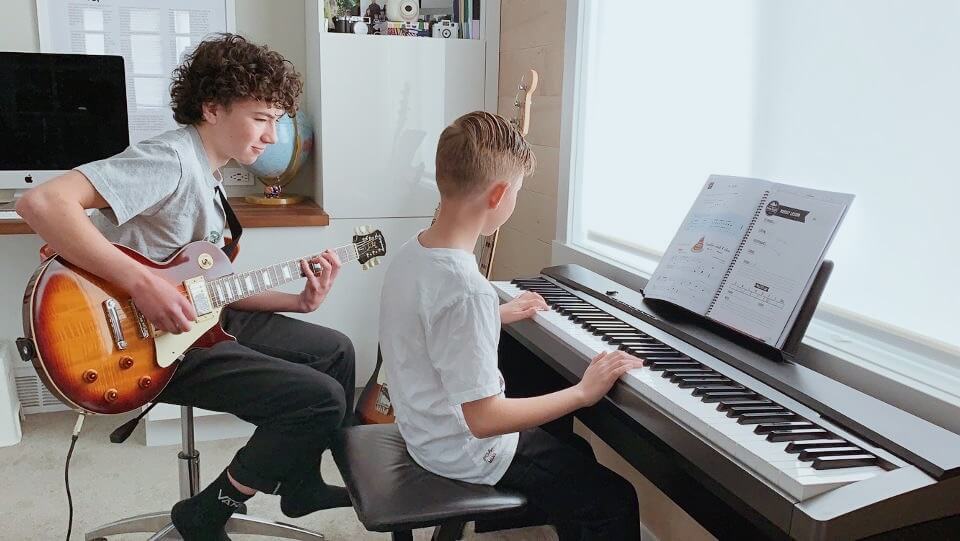
In today's fast-paced and ever-evolving world, it is crucial to equip children with essential life skills that will help them navigate through various challenges and excel in their personal and professional lives. While there are numerous activities available to children, learning a musical instrument stands out as a holistic and highly effective method of fostering personal growth and development. At The Piano Place, we firmly believe that learning a musical instrument, such as the piano, not only cultivates musical talent but also instills a wide range of invaluable skills that positively impact a child's life. Below we will explore 14 ways in which children who learn a musical instrument experience an increased sense of responsibility, emotional resilience, self-confidence, hand-eye coordination, self-discipline, and much more!
Learning a musical instrument requires commitment and dedication. Children who undertake this journey learn to take responsibility for their progress, practice routines, and meet musical goals. They understand the importance of regular practice, setting aside time, and being accountable for their own improvement.
2. Emotional Resilience:
Music is a powerful medium for emotional expression, and learning to play an instrument enables children to channel their emotions through music. Through the ups and downs of learning and performing, they develop emotional resilience, learning to cope with frustration, disappointment, and perseverance in the face of challenges.
3. Self-Confidence:
Mastering a musical instrument boosts self-confidence in children. As they progress and achieve milestones, their sense of accomplishment grows, leading to increased self-assurance in other areas of life as well. Performing in front of others and receiving positive feedback also enhances their self-esteem.
4. Hand-Eye Coordination:
Playing a musical instrument requires precise coordination between the hands, eyes, and sometimes even the feet. This constant coordination exercises and strengthens these connections, enhancing fine motor skills and hand-eye coordination in children.
5. Self-Discipline:
Learning a musical instrument demands discipline, patience, and perseverance. Children develop self-discipline by adhering to regular practice schedules, following lesson plans, and working towards long-term goals. This discipline extends to other aspects of their lives, such as academics and personal commitments.
6. Ability to Memorize:
Music involves memorization of notes, rhythms, and techniques. By training their brains to retain and recall this information, children improve their overall memory skills. This ability to memorize extends beyond music and benefits their academic performance as well.
7. Focus:
Playing an instrument requires concentration and focus. Children learn to concentrate on multiple elements simultaneously, such as reading sheet music, finger placement, timing, and dynamics. This ability to focus extends to other areas of their lives, enhancing their productivity and attention span.
8. Resilience/Grit:
Learning a musical instrument involves perseverance and resilience. Children face challenges like difficult passages, complex rhythms, and performing in front of an audience. By overcoming these hurdles, they develop resilience and grit, which are essential qualities for success in all aspects of life.
9. Higher IQ:
Research suggests a positive correlation between musical training and intelligence quotient (IQ). Learning an instrument engages various cognitive processes, including problem-solving, pattern recognition, and spatial-temporal skills. These cognitive abilities foster intellectual growth and may lead to higher IQ scores in children.
10. Ability to Receive and Implement Constructive Criticism:
Music lessons provide an environment for children to receive constructive criticism from their teachers. They learn to accept feedback, adapt their techniques, and improve their performance. This skill translates into being open to feedback in other areas of life, promoting continuous learning and personal growth.
11. Self-Awareness:
As children learn to play an instrument, they develop a heightened sense of self-awareness. They learn to listen to their own playing, identify areas for improvement, and make adjustments accordingly. This self-awareness extends beyond music, helping them understand their strengths, weaknesses, and personal growth areas.
12. Ability to Manage Nerves:
Performing in front of an audience can be nerve-wracking, but learning an instrument teaches children how to manage performance anxiety and nerves. They develop techniques such as deep breathing, visualization, and positive self-talk, which can be applied in various situations requiring composure and confidence.
13. Math Comprehension:
Music and mathematics are closely intertwined. Learning rhythm, timing, and reading musical notation involve understanding fractions, patterns, and counting. This engagement with mathematical concepts during musical training can enhance a child's math comprehension skills.
14. Understanding of Delayed Gratification:
Learning a musical instrument is a journey that requires patience and delayed gratification. Children learn that mastery and progress take time, and consistent effort leads to rewarding outcomes. This understanding of delayed gratification instills patience and persistence in their overall approach to life.
At The Piano Place, we believe that investing in musical education for children provides a solid foundation for their personal and academic development, empowering them to thrive in a rapidly changing world. Let the harmonies of music unlock a world of opportunities for your child's growth and success. Enroll your child today!